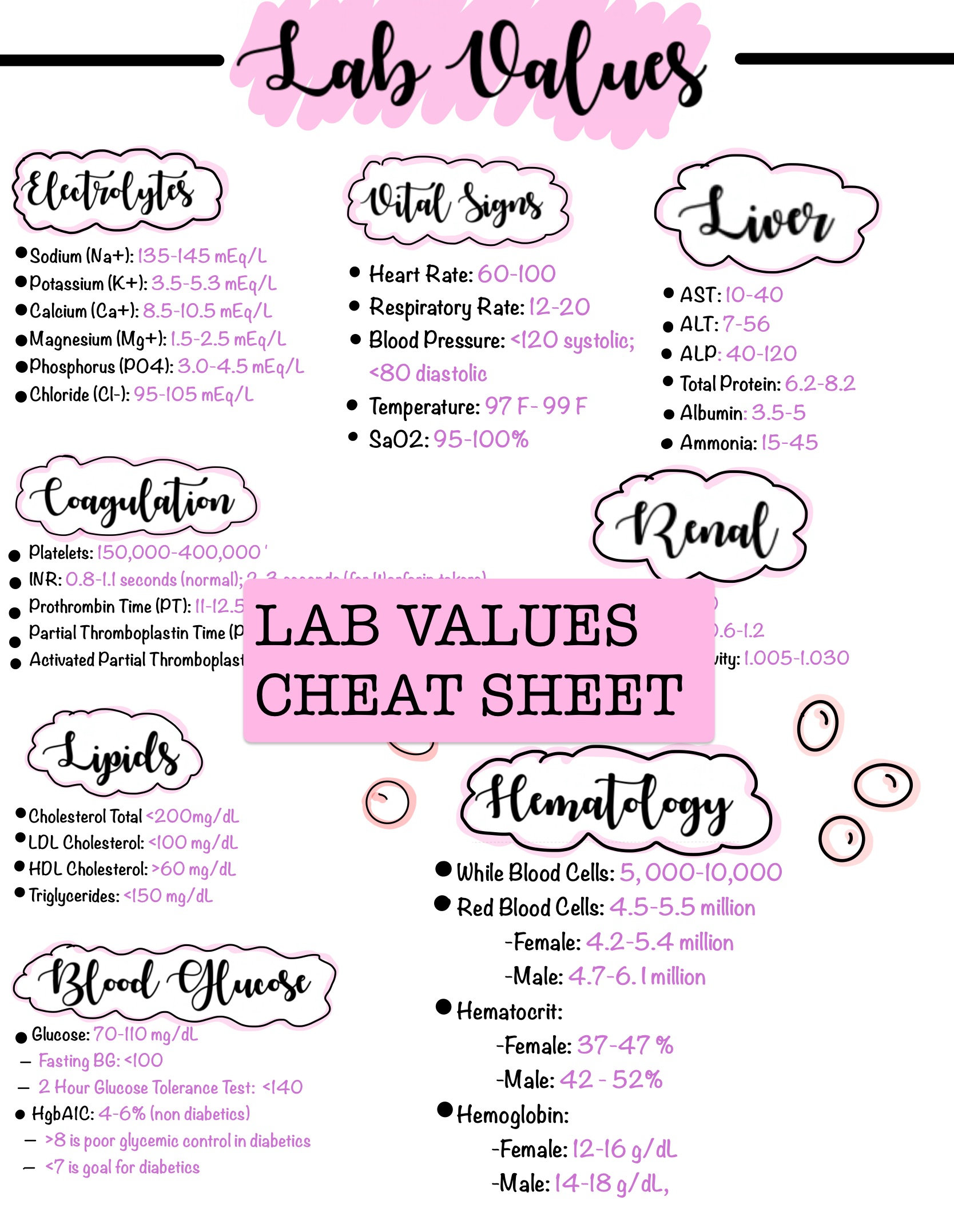If you’re a nursing student or a nurse, you know how challenging it can be to keep track of all the lab values you need to know for your patients. Fortunately, there are resources available to help you remember all of the important information you need to provide excellent care. One such resource is a lab values cheat sheet, like the one you can find on Etsy.
Lab Values Cheat Sheet Nursing Notes NCLEX Review Mark
 This lab values cheat sheet is an excellent tool for nursing students or practicing nurses who need to keep track of typical lab values for various tests. This resource can be particularly helpful if you’re studying for the NCLEX exam or just need a refresher on typical lab values.
This lab values cheat sheet is an excellent tool for nursing students or practicing nurses who need to keep track of typical lab values for various tests. This resource can be particularly helpful if you’re studying for the NCLEX exam or just need a refresher on typical lab values.
The cheat sheet features a table with the most common lab values on one side and some helpful tips and tricks for remembering those values on the other side. The table is organized by category (e.g., electrolytes, liver function tests, renal function tests, etc.) and includes information on the typical range for each value, as well as what a high or low value might indicate.
For example, under the electrolytes category, you’ll find information on the normal ranges for sodium (135-145 mEq/L), potassium (3.5-5.0 mEq/L), chloride (98-106 mEq/L), and bicarbonate (22-28 mEq/L). You’ll also find helpful tips for remembering which electrolyte affects which body part or function.
On the other side of the cheat sheet, you’ll find mnemonic devices and other tips to help you remember important lab values. For example, to remember the normal range for hemoglobin (12-18 g/dL), you might use the mnemonic “Hi! He-Mo-Glo-Bin!”
How to Use the Cheat Sheet
There are a few different ways you can use this lab values cheat sheet to help you in your studies and in your nursing practice. Here are just a few ideas:
- Print out a copy of the cheat sheet and keep it in your scrubs pocket or in your study materials so you can easily reference it when needed.
- Use the mnemonic devices and other tips on the cheat sheet to help you remember important lab values.
- Challenge yourself to recall important lab values without the cheat sheet. This can help you identify areas where you might need to study more.
- Use the cheat sheet to quiz yourself or your classmates on lab values. This can be a fun and effective way to reinforce your learning.
Why Lab Values Are Important
As a nurse, you’ll be responsible for monitoring and interpreting lab values for your patients. Understanding what these lab values mean is essential for providing good care.
Lab values can give you important information about a patient’s overall health, as well as specific organ functions. For example, a high level of creatinine (a waste product produced by the muscles) in a patient’s blood might indicate that their kidneys are not functioning properly. A low level of hemoglobin (the protein in red blood cells that carries oxygen) might indicate that a patient is anemic.
By monitoring and interpreting lab values, you’ll be able to identify potential health problems and work with the rest of the healthcare team to develop a plan of care for your patient. This might include adjusting medications, providing fluids, or recommending additional tests or treatments.
Other Resources for Learning Lab Values
The lab values cheat sheet from Etsy is a great resource, but it’s not the only one available. Here are a few other resources you might find helpful:
- NCLEX review books: Most NCLEX review books include a section on lab values, along with practice questions to help you reinforce your learning.
- Online resources: You can find a wealth of information on lab values online, including charts and tables that organize the information for you. Just be sure to verify that your sources are reputable.
- Flashcards: If you’re a fan of flashcards, you can create your own or purchase pre-made sets that cover lab values.
- Study groups: Studying with a group of classmates or colleagues can be a great way to reinforce your learning and quiz each other on lab values.
No matter which resources you choose to use, remember that learning lab values takes time and practice. Be patient with yourself and don’t hesitate to ask for help if you need it.
Conclusion
A lab values cheat sheet can be an incredibly helpful resource for nursing students and practicing nurses alike. By providing a quick reference to typical lab values and tips for remembering them, this cheat sheet can help you provide excellent care to your patients.
Remember that understanding lab values is an essential part of being a nurse. By learning and practicing interpreting these values, you’ll be able to identify potential health problems and work with the rest of the healthcare team to develop a plan of care for your patients.